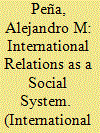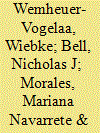| Srl | Item |
| 1 |
ID:
168411


|
|
|
|
|
| Summary/Abstract |
Against current developments in the sociology of IR, from new systemic theorizations of world society to Bourdieusian approaches to the practices of IR scholars, this article claims that relevant problems remain regarding how IR theorizes its social location and reconciles the social character of the world it observes with the social character of its observations. To reformulate these problems, the article draws from an underused paradigm of social system theorizing, sociocybernetics, offering a radical constructivist treatment of the problem of observation and reflexivity. Elaborating the notion of second-order cybernetics and Niklas Luhmann's take on the reproduction of observing social systems, the article argues that IR can be conceived as an observing social system that adapts by altering and subdividing the semantic boundaries of its systemic communications, that is, IR theories. This socio-heuristic process structures both the first-order observations IR makes about the world, as well as second-order observations of itself. In this manner, the article argues that sociocybernetics-informed sociology of IR communications can contribute to a more nuanced understanding of IR as a social system that observes society from society.
|
|
|
|
|
|
|
|
|
|
|
|
|
|
|
|
| 2 |
ID:
145117


|
|
|
|
|
| Summary/Abstract |
This article presents findings from the 2014 Teaching, Research, and International Policy (TRIP) Project’s worldwide faculty survey that speak to recent claims in the Global International Relations (IR) Debate. The expansion of the 2014 TRIP faculty survey to thirty-two countries, including more than a dozen non-Western IR communities, enables an initial empirical assessment of some key questions raised by advocates and detractors of “Global IR.” This contribution describes and analyzes scholars’ own perceptions of the IR discipline and adds to the empirical literature on the Global IR Debate. In particular, we address three claims: that IR is a Western/American dominated discipline, that geography is the core dividing line in IR, and that there is a division of labor within IR wherein scholars in the West are responsible for theory production while the non-West supplies data and local expertise for theory testing. We believe that these findings shed light both on how the discipline came to be divided between dominant and marginalized discourses and in which areas this division is most embedded and/or ready to be dismantled.
|
|
|
|
|
|
|
|
|
|
|
|
|
|
|
|